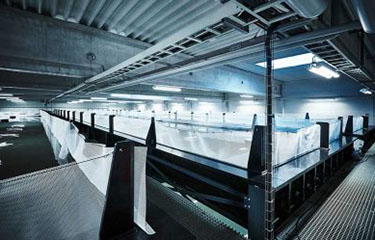With large-scale RAS, Oceanloop wants to revolutionize shrimp-farming industry

CORRECTION: An earlier version of this article incorrectly stated that Oceanloop uses a biofloc system. The company has developed a custom clearwater system that it plans to use in its large-scale farm under development.
Munich, Germany-based Oceanloop is seeking nothing less than a full-scale remaking of the global shrimp industry.
The company, forged through the combination of Strande, Germany-based land-based shrimp-farming firm Förde Garnelen; Osterberg, Germany-based aquaculture technology company Neomar; and Munich-based recirculating aquaculture system (RAS) technology and shrimp distribution firm Crusta Nova; has the goal of revolutionizing shrimp farming with state-of-the-art recirculating aquaculture technology, according to co-CEO Bert Wecker.
“Oceanloop allows [for] the production of high-quality, antibiotic-free, and sustainable saltwater shrimp farming,” he said.
Wecker, who has been involved in the research and development of RAS for two decades, spent the past eight years perfecting a new clearwater system for shrimp through Neomar and former employer, Sander Holdings. The technology sets new standards in land-based aquaculture, he said.
“This development heralded a significant breakthrough in enabling the scalability of our technology today,” he said.
Previously used for water treatment systems for aquariums, Sander’s development of next-generation protein skimmers and ozone generators, which are highly effective in purifying water, were breakthroughs that brought RAS to the attention of the aquaculture industry, he said.
The new clearwater system uses external biofiltration to remove nitrifying bacteria and filters to remove solids. Oceanloop relies on biofloc technology, which is traditionally common in large-scale shrimp farms, to introduce cultured microorganisms to form microbial protein from fish waste and other organic matter in the water. The shrimp, in turn, eat the microbial protein.
Plans for the farm include implementing an “urban mangrove” system, in which stacking rack systems developed by Wecker and his team recreate the natural habitat of shrimp within the tanks.
Wecker is confident that the system offers a significant reduction in resource use and negative environmental impact compared to conventional farms, stating that the global warming potential (GWP) of 1 MT of shrimp farmed in an Oceanloop system is as much as 77 percent less than in open-pond farms. It also requires up to 49 percent less land, up to 96 percent less water, and uses 100 percent sustainable energy sources such as solar and wind power.
To prove its feasibility, the Oceanloop model has undergone successful trials using fresh seawater at Förde Garnelen’s land-based farm in Kiel, Germany, which currently produces around 5 MT of shrimp per year, and at the company’s Munich farm, which uses artificial seawater and produces 20 MT per year. Oceanloop technology has also been effective at scale with sea bass, sea bream, and kingfish, Wecker said. Those farms rely on imported, certified, disease-free shrimp larvae (PLs), Oceanloop’s planned expansion includes the construction of a dedicated hatchery that will give the company total control of its means of production.
For Wecker, creating a superior RAS system is not just a matter of ensuring the water quality and the environment is right but also about paying attention to the genetics of the shrimp and breeding animals best suited to the conditions, reducing the mortality rate in the long term...
Photo courtesy of Oceanloop





Share